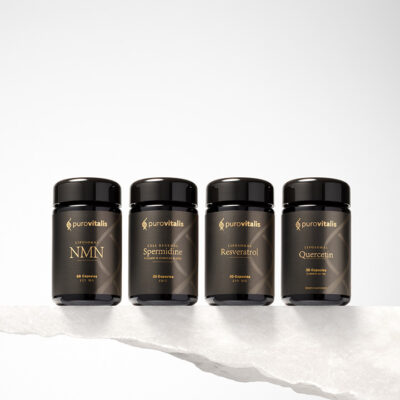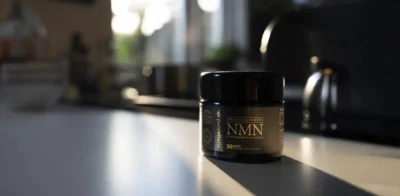
La edad y la inflamación están profundamente entrelazadas, y procesos como la inflamación-envejecimiento desempeñan un papel clave en la forma en que nuestro cuerpo cambia con el tiempo. En este artículo, exploraremos lo que esto significa para tu salud y compartiremos cómo comprender esta conexión puede ayudarte a controlar la inflamación y favorecer un envejecimiento saludable.
El doble papel de la inflamación: Curación y Daño
La inflamación es una respuesta biológica compleja que desempeña un papel crucial en el mecanismo de defensa del organismo[1,2]. A menudo se describe como un arma de doble filo debido a su capacidad tanto para curar como para dañar. Comprender la naturaleza dual de la inflamación es esencial para apreciar su papel en la salud y la enfermedad.
Cómo contribuye la inflamación al proceso de curación
La inflamación es una parte natural y esencial del proceso de curación del organismo. Cuando se produce una lesión o una infección, el cuerpo responde con una inflamación aguda, caracterizada por enrojecimiento, calor, hinchazón y dolor[3]. Esta respuesta es crucial para combatir las infecciones e iniciar el proceso de curación. La inflamación aguda ayuda a aislar la zona afectada, evitando la propagación de agentes nocivos, y facilita la reparación de los tejidos dañados[4]. La respuesta del sistema inmunitario a una lesión implica una serie de interacciones complejas que promueven la reparación y recuperación de los tejidos. Este proceso es vital para la supervivencia, ya que protege al organismo de bacterias, virus y toxinas[5]. Una vez completada la curación, el cuerpo suele desactivar la respuesta inflamatoria, permitiendo que los tejidos vuelvan a su estado normal[6].
El impacto negativo de la inflamación crónica
Mientras que la inflamación aguda es beneficiosa, la inflamación crónica puede ser perjudicial[7]. La inflamación crónica es una respuesta inflamatoria persistente de bajo grado que puede durar meses o incluso años[8]. A diferencia de la inflamación aguda, que se resuelve tras la curación, la inflamación crónica no se apaga y puede provocar daños en los tejidos[9]. Este estado inflamatorio prolongado se asocia a una amplia gama de enfermedades, como las cardiovasculares, la diabetes, el cáncer y los trastornos autoinmunes[10]. La inflamación crónica puede progresar silenciosamente, causando síntomas como fatiga, dolor articular y problemas de salud mental[11]. A menudo está relacionada con factores del estilo de vida, como una dieta inadecuada, la inactividad física y el estrés, que pueden exacerbar la respuesta inflamatoria[12]. El control de la inflamación crónica implica cambios en el estilo de vida, como una dieta sana, ejercicio regular y control del estrés[13].
Regeneración Resoluble vs. Irresoluble
En la transición de la inflamación aguda a la crónica puede influir la capacidad del organismo para resolver la inflamación[14]. La regeneración resoluble se produce cuando el cuerpo repara con éxito el daño tisular y desactiva la respuesta inflamatoria[15]. Sin embargo, cuando el organismo no consigue resolver la inflamación, puede producirse una regeneración irresoluble, que contribuye a la inflamación crónica[16]. La regeneración irresoluble puede deberse a infecciones persistentes, factores estresantes ambientales o una respuesta inmunitaria hiperactiva que se dirige erróneamente a los tejidos sanos[17]. Esto puede dar lugar a un ciclo continuo de inflamación y daño tisular, aumentando el riesgo de enfermedades crónicas[18].
¿Causa la inflamación (inflamación-envejecimiento) el envejecimiento?
Las investigaciones demuestran que la inflamación crónica desempeña un papel importante en la aceleración del proceso de envejecimiento[23]. Esta inflamación continua de bajo nivel, conocida como "inflamación-envejecimiento", contribuye significativamente al envejecimiento y aumenta el riesgo de enfermedades relacionadas con la edad[24]. La inflamación-envejecimiento se refiere a un estado de inflamación sistémica persistente que se produce a medida que envejecemos, incluso en ausencia de una infección o lesión evidente.
Este proceso está impulsado por diversos factores, como el daño celular, la desregulación del sistema inmunitario y la acumulación de moléculas nocivas en el organismo. El inflam-envejecimiento no sólo acelera el envejecimiento biológico, sino que también crea un círculo vicioso en el que las células envejecidas liberan más señales inflamatorias, alimentando aún más el proceso[25]. Comprender y abordar el inflamaenvejecimiento es crucial porque desempeña un papel clave en el desarrollo de afecciones como las enfermedades cardiacas, la diabetes y los trastornos neurodegenerativos.
¿Aumenta la inflamación con la edad?
Las investigaciones demuestran sistemáticamente que la inflamación y el envejecimiento están estrechamente relacionados, y que la inflamación aumenta de forma natural a medida que envejecemos[26]. Este aumento de la inflamación, un rasgo distintivo tanto de la inflamación como del envejecimiento, se produce incluso cuando no hay infección ni lesión[27]. Se caracteriza por:
- Mayores niveles de proteínas promotoras de la inflamación (citoquinas proinflamatorias)
- Cambios en el funcionamiento de las células inmunitarias
- Activación continua de las defensas inmunitarias básicas del organismo (sistema inmunitario innato)[28].
¿Cómo acelera la inflamación el envejecimiento?
La inflamación crónica acelera el proceso de envejecimiento a través de múltiples mecanismos, lo que pone de relieve la compleja relación entre la edad y la inflamación[29]:
- Daño del ADN y senescencia celular
- Disfunción mitocondrial
- Acortamiento de los telómeros
- Degeneración tisular
- Deterioro de la función de las células madre[30]
Estos procesos contribuyen a los rasgos distintivos del envejecimiento y de las enfermedades relacionadas con la edad[31]. El estado inflamatorio persistente altera la homeostasis normal de los tejidos y los mecanismos de reparación, lo que conduce al deterioro progresivo de los sistemas orgánicos[32].
Cómo reducir la inflamación en la vejez
El tratamiento de la inflamación en los adultos mayores requiere un enfoque integral, ya que la inflamación y el envejecimiento están estrechamente relacionados[33]:
Intervenciones sobre el estilo de vida
- Dieta de estilo mediterráneo rica en alimentos antiinflamatorios
- Actividad física regular
- Sueño adecuado
- Gestión del estrés[34]
Modificaciones medioambientales
- Reducción de la exposición a toxinas ambientales
- Mantenimiento de una microbiota intestinal sana
- Tratamiento de enfermedades crónicas[35]
Enfoques terapéuticos
- Suplementos antiinflamatorios
- Medicamentos específicos cuando proceda
- Control sanitario periódico[36]
Incorporar alimentos, bebidas y suplementos antiinflamatorios a la vida diaria puede proporcionar importantes beneficios para la salud. A continuación se presentan opciones prácticas para ayudar a controlar eficazmente la inflamación.
| Fuente | Beneficios antiinflamatorios | Integración diaria |
| Vitamina D3 | Ayuda a regular el sistema inmunitario y a reducir los niveles de PCR¹ | Se obtiene mediante la exposición a la luz solar o mediante suplementos |
| Curcumina | Reduce las respuestas inflamatorias del organismo². | Consumir como suplemento o incorporar la cúrcuma a las comidas |
| Quercetina | Disminuye los marcadores de inflamación y estrés oxidativo³ | Obtenlo de frutas como manzanas y bayas, o utiliza suplementos |
| Jengibre | Favorece la función inmunitaria y reduce la inflamación⁴. | Incorpora jengibre fresco en infusiones o comidas, o tómalo como suplemento |
| Té verde (EGCG) | Disminuye la inflamación y favorece la salud cardiovascular⁵ | Consume té verde regularmente o toma un suplemento de EGCG |
| Aceite de pescado (Omega-3) | Reduce los marcadores inflamatorios y favorece la salud en general⁶. | Consume pescado graso como el salmón o utiliza un suplemento de alta calidad |
| Resveratrol | Protege contra el daño tisular relacionado con la inflamación⁷ | Consumir a través de uvas rojas, bayas o como suplemento |
También te puede interesar este artículo Quercetina e inflamación - Explorando las posibilidades.
Conclusión
La inflamación es un componente vital de la respuesta inmunitaria del organismo, esencial para curar lesiones y combatir infecciones[19]. Sin embargo, cuando la inflamación se vuelve crónica, puede provocar importantes problemas de salud y está estrechamente ligada a los procesos de edad, inflamación e inflamación-envejecimiento[20]. Comprender el equilibrio entre la regeneración resoluble y la no resoluble es clave para prevenir la inflamación crónica y sus enfermedades asociadas[21]. Adoptando un estilo de vida saludable y abordando los factores ambientales y del estilo de vida, las personas pueden ayudar a controlar la inflamación, reducir los efectos de la inflamación-envejecimiento, favorecer un envejecimiento saludable y promover el bienestar general[22].
Referencias
1. Medzhitov R. Origen y funciones fisiológicas de la inflamación. Nature. 2008;454(7203):428-35.
2. Rock KL, Kono H. La respuesta inflamatoria a la muerte celular. Annu Rev Pathol. 2008;3:99-126.
3. Chen L, Deng H, Cui H, et al. Respuestas inflamatorias y enfermedades asociadas a la inflamación en órganos. Oncotarget. 2018;9(6):7204-7218.
4. Hunter P. La teoría de la inflamación de la enfermedad. EMBO Rep. 2012;13(11):968-70.
5. Nathan C, Ding A. Inflamación no resolutiva. Cell. 2010;140(2):871-882.
6. Buckley CD, Gilroy DW, Serhan CN. Mediadores y mecanismos lipídicos proresolutivos en la resolución de la inflamación aguda. Inmunidad. 2014;40(3):315-27.
7. Hunter P. La teoría de la inflamación de la enfermedad. EMBO Rep. 2012;13(11):968-70.
8. Franceschi C, Campisi J. La inflamación crónica (inflammaging) y su posible contribución a las enfermedades asociadas a la edad. J Gerontol A Biol Sci Med Sci. 2014;69 Suppl 1(Suppl 1):S4-9.
9. Nathan C, Ding A. Inflamación no resolutiva. Cell. 2010;140(2):871-882.
10. Mantovani A, Allavena P, Sica A, Balkwill F. Inflamación relacionada con el cáncer. Nature. 2008;454(7203):436-44.
11. Furman D, Campisi J, Verdin E, et al. La inflamación crónica en la etiología de la enfermedad a lo largo de la vida. Nat Med. 2019;25(12):1822-1832.
12. Furman D, Campisi J, Verdin E, et al. Inflamación crónica en la etiología de la enfermedad a lo largo de la vida. Nat Med. 2019;25(12):1822-1832.
13. Franceschi C, Campisi J. La inflamación crónica (inflammaging) y su posible contribución a las enfermedades asociadas a la edad. J Gerontol A Biol Sci Med Sci. 2014;69 Suppl 1(Suppl 1):S4-9.
14. Buckley CD, Gilroy DW, Serhan CN. Mediadores y mecanismos lipídicos proresolutivos en la resolución de la inflamación aguda. Inmunidad. 2014;40(3):315-27.
15. Nathan C, Ding A. Inflamación no resolutiva. Cell. 2010;140(2):871-882.
16. Nathan C, Ding A. Inflamación no resolutiva. Cell. 2010;140(2):871-882.
17. Buckley CD, Gilroy DW, Serhan CN. Mediadores y mecanismos lipídicos proresolutivos en la resolución de la inflamación aguda. Inmunidad. 2014;40(3):315-27.
18.Nathan C, Ding A. Inflamación no resolutiva. Cell. 2010;140(2):871-882.
19. Medzhitov R. Origen y funciones fisiológicas de la inflamación. Nature. 2008;454(7203):428-35.
20. Furman D, Campisi J, Verdin E, et al. Inflamación crónica en la etiología de la enfermedad a lo largo de la vida. Nat Med. 2019;25(12):1822-1832.
21. Nathan C, Ding A. Inflamación no resolutiva. Cell. 2010;140(2):871-882.
22. Furman D, Campisi J, Verdin E, et al. Inflamación crónica en la etiología de la enfermedad a lo largo de la vida. Nat Med. 2019;25(12):1822-1832.
23. Franceschi C, et al. Inflammaging: a new immune-metabolic viewpoint for age-related diseases. Nat Rev Endocrinol. 2018;14(10):576-590.
24. López-Otín C, et al. Los rasgos distintivos del envejecimiento. Cell. 2013;153(6):1194-1217.
25. Ferrucci L, Fabbri E. Inflammaging: chronic inflammation in ageing, cardiovascular disease, and frailty. Nat Rev Cardiol. 2018;15(9):505-522.
26. Kennedy BK, et al. Geroscience: linking aging to chronic disease. Cell. 2014;159(4):709-713.
27. Goldberg EL, Dixit VD. Factores impulsores de la inflamación relacionada con la edad y estrategias para prolongar la esperanza de vida. Immunol Rev. 2015;265(1):63-74.
28. Fulop T, et al. Inmunosenescencia e inflamación-envejecimiento como dos caras de la misma moneda: ¿amigos o enemigos? Front Immunol. 2018;8:1960.
29. Franceschi C, Campisi J. La inflamación crónica (inflammaging) y su posible contribución a las enfermedades asociadas a la edad. J Gerontol A Biol Sci Med Sci. 2014;69(Suppl 1):S4-9. 30. Prattichizzo F, et al. Inflamación y metaflamación: El yin y el yang de la diabetes tipo 2. Ageing Res Rev. 2018;41:1-17.
31. López-Otín C, et al. Los rasgos distintivos del envejecimiento. Cell. 2013;153(6):1194-1217.
32. Furman D, et al. Inflamación crónica en la etiología de la enfermedad a lo largo de la vida. Nat Med. 2019;25(12):1822-1832.
33. Calder PC, et al. Relevancia para la salud de la modificación de la inflamación de bajo grado en el envejecimiento (inflammaging) y el papel de la nutrición. Ageing Res Rev. 2017;40:95-119.
34. Minihane AM, et al. Inflamación de bajo grado, composición de la dieta y salud: pruebas de la investigación actual y su traducción. Br J Nutr. 2015;114(7):999-1012.
35. Clements SJ, Carding SR. Dieta, microbiota intestinal y salud inmunitaria en el envejecimiento. Crit Rev Food Sci Nutr. 2018;58(4):651-661.
36. Ferrucci L, Fabbri E. Inflammaging: chronic inflammation in ageing, cardiovascular disease, and frailty. Nat Rev Cardiol. 2018;15(9):505-522.

Controla más de 50 métricas de salud con la precisión de la IA. Empieza hoy tu prueba gratuita y toma el control de tu viaje hacia el bienestar.

suplementos premium Tecnología liposomal fabricado en la UE Probado en laboratorios de terceros
¡Experimente la vida al máximo porque se merece lo mejor! ¡Pruebe los suplementos Purovitalis!












